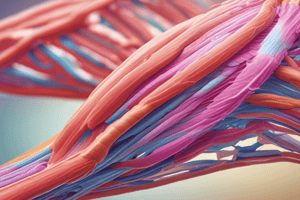Podcast
Questions and Answers
What is the primary function of adenylate kinase and creatine kinase during exercise?
What is the primary function of adenylate kinase and creatine kinase during exercise?
- To replenish ATP from glycogen stores
- To convert lactate into glucose
- To produce ATP from creatine phosphate (correct)
- To initiate anaerobic respiration
Which type of muscle fibers primarily relies on anaerobic respiration?
Which type of muscle fibers primarily relies on anaerobic respiration?
- Type I muscle fibers
- Intermediate muscle fibers
- Slow-twitch muscle fibers
- Fast-twitch muscle fibers (correct)
What is one of the mechanisms of muscle fatigue?
What is one of the mechanisms of muscle fatigue?
- Oxidative stress from free radicals (correct)
- A decrease in muscle fiber size
- Increased creatine phosphate levels
- Improved ATP production
What best describes muscle soreness after vigorous exercise?
What best describes muscle soreness after vigorous exercise?
What is the term for the lag time between starting exercise and increased breathing rate?
What is the term for the lag time between starting exercise and increased breathing rate?
How does muscle fiber fatigue help prevent damage?
How does muscle fiber fatigue help prevent damage?
What characterizes smooth muscle cells?
What characterizes smooth muscle cells?
What is the primary consequence of acidosis in muscle fatigue?
What is the primary consequence of acidosis in muscle fatigue?
What structure connects cardiac muscle cells to each other?
What structure connects cardiac muscle cells to each other?
Which of the following accurately describes cardiac muscle contraction?
Which of the following accurately describes cardiac muscle contraction?
In the context of skeletal muscle anatomy, which term describes the less mobile attachment point of a muscle?
In the context of skeletal muscle anatomy, which term describes the less mobile attachment point of a muscle?
Which term refers to a group of muscles that work together to produce a specific movement?
Which term refers to a group of muscles that work together to produce a specific movement?
What is the role of the retinaculum in relation to skeletal muscle?
What is the role of the retinaculum in relation to skeletal muscle?
Which is NOT a characteristic of cardiac muscle cells?
Which is NOT a characteristic of cardiac muscle cells?
Flashcards are hidden until you start studying
Study Notes
ATP Production as Exercise Progresses
- Muscle fibers can sustain contraction using stored ATP for approximately 5 to 6 seconds.
- ATP production via adenylate kinase and creatine kinase supports activity for up to 15 seconds.
- Anaerobic respiration is the main pathway when ATP stores and creatine phosphate are depleted due to intense exercise.
- Fast-twitch muscle fibers primarily rely on anaerobic metabolism, while slow-twitch fibers use aerobic pathways.
- Lactate produced in fast-twitch fibers serves as a substrate for aerobic ATP production in slow-twitch fibers.
Muscle Fatigue
- Fatigue leads to a temporary decline in work capacity and prevents potential structural damage to muscle fibers and surrounding tissues.
- Major mechanisms of fatigue include:
- Acidosis and ATP depletion, resulting from high ATP consumption or reduced production.
- Oxidative stress caused by the accumulation of reactive oxygen species (ROS).
- Local inflammatory responses.
Muscle Soreness
- Muscle pain, known as delayed onset muscle soreness (DOMS), can occur after intense physical activity and may persist for several days.
- Soreness is linked to inflammatory chemicals affecting muscle fibers.
- Alternating exercise with rest days helps facilitate muscle repair, such as not lifting weights on consecutive days.
Oxygen Deficit
- Oxygen deficit refers to the initial period when oxygen consumption lags behind the start of exercise.
- Excess post-exercise oxygen consumption occurs after physical activity, during which the body takes time to return to pre-exercise oxygen consumption levels.
Smooth Muscle
- Smooth muscle consists of non-striated, spindle-shaped cells, typically with one nucleus.
- Myofilament organization differs from striated muscle as they lack sarcomeres.
- Smooth muscle operates involuntarily and is influenced by neurotransmitters and hormones.
Cardiac Muscle
- Cardiac muscle features long, striated, branching cells, typically with one nucleus.
- The striated appearance is due to structured sarcomeres.
- Characterized by autorhythmic contractions and interconnected via intercalated disks that include desmosomes and gap junctions.
- Action potentials in one cell can trigger neighboring cardiac muscle cells, functioning collectively as a unit.
Skeletal Muscle Anatomy
- Skeletal muscle connects to bone through tendons; wide tendons are called aponeuroses.
- Retinacula are connective tissue bands that anchor tendons at joints, such as wrists and ankles.
- Skeletal muscle has an origin (less movable attachment) and an insertion (more movable attachment).
- The muscle belly lies between the origin and insertion points.
- Muscles that work together are termed agonists, whereas those opposing actions are called antagonists.
Studying That Suits You
Use AI to generate personalized quizzes and flashcards to suit your learning preferences.




